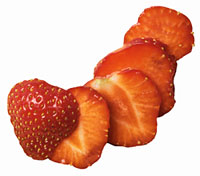
Try these easy and nutritious solutions to keep your children’s minds and bellies happy.
Imagine it’s 10 am and your child wants a snack. Before you grab that conveniently packaged cookie, stop and think for a minute. Do you really want to feed your child a snack of artificial food additives, sugar, and refined flour? Or, does feeding your child vital nutrients to grow a healthy mind and body sound more appealing? If so, read on for some of the health benefits of yogurt, strawberries, and almonds — super snacks that will have your child feeling great!
What are the benefits of yogurt?
Yogurt is a great source of the calcium and protein needed to help grow healthy bones and bodies. Yogurt also naturally contains something called probiotics, which are living microorganisms that can improve health. Probiotics, such as the Lactobacilli, Bifidobacter, S. Thermophilus, L. Bulgaricus, and L. Acidophilus found in yogurt, help replenish the “good” bacteria in your body. Probiotics also help to improve:
- Lactose intolerance: A condition that makes milk products difficult to digest due to a lack of the enzyme lactase which is needed to digest the sugar lactose found in milk products.
- Dental cavities: Some studies suggest the consumption of yogurt rich in the probiotic bifidobacteria may help reduce microorganisms found in the saliva that can lead to dental cavities. (Here are some more great tips to protect your child’s teeth.)
- Immune function: Lactic acid producing bacteria may act as a barrier along the digestive tract against harmful bacteria and enhance the immune system to fight infections.
- Irregular Bowel Movements: Probiotics act to regulate the time it takes food to travel through the intestines and can help to resolve problems of both constipation and diarrhea. Studies have shown that after people consumed L. bulgaricus, S. thermophilus, or L. acidophilus, those with chronic constipation experienced an increase in bowel movements.
What should you look for when buying yogurt?
When buying yogurt, look for “live active cultures” on the label. Most labels will even tell you exactly what cultures are included. Avoid purchasing yogurts made with artificial colorings and/or sweeteners. Don’t be misled when reading the food label. Sugar will be listed under grams of carbohydrates and may appear high; milk sugar and table sugar are listed as combined. You’ll need to read the ingredient list to check for added sweeteners. Other varieties of yogurt include soy yogurt and organic yogurt. Try buying plain yogurt and sweetening with your own fruit, jams, or apple butter to avoid too much added sugar. Always check the expiration date to make sure it is fresh, and store it in the refrigerator in the original container. Click here for more information on the unique health benefits of Greek Yogurt.
What are some yogurt snack ideas?
- Mix a favorite cold cereal or granola with yogurt
- Top yogurt with fresh strawberries or blueberries
- Add chopped chive and dill weed to plain yogurt and use in place of sour cream
- Simply enjoy a favorite flavor of yogurt by itself
Why are strawberries a good snack option?

Have you ever noticed all of those fruit beverages and fruit snacks you may feed your child don’t contain any real fruit? Instead of letting your child sip on imitation fruit juice made with artificial colorings, preservatives, and sugar, let them snack on some delicious, juicy strawberries. Strawberries are sweet and packed full of nutrients. Strawberries are high in vitamin C, a known antioxidant that protects the body from free radicals, cancer, and cardiovascular disease. Vitamin C has also been found to:
- Shorten the duration of the common cold
- Decrease oxidative damage to DNA
- Decrease asthmatic symptoms
- Strawberries can also brighten your teeth!
What should you look for when buying strawberries?
Choose strawberries that are firm, plump and shiny. Caps should be fresh, green, and unbroken. Avoid shriveled, mushy, leaky, or moldy strawberries. When purchasing in a pre-packaged container make sure the container has no signs of stains or moisture which can indicate spoilage. It’s best not to wash strawberries until ready to eat. Strawberries can be stored in the refrigerator for 1-3 days. To freeze, wash and pat dry. Then, place on a flat pan in the freezer. Once frozen, berries can be placed in a plastic bag and be kept for up to one year. Wash strawberries well. When possible, buy organic strawberries as these will have lower pesticide levels -learn what organic means.
What are some strawberry snack ideas?
- Make a strawberry fruit smoothie
- Top yogurt with strawberries
- Mixed fruit salad
- Slice and cook with balsamic vinegar and a bit of sugar
- Enjoy strawberries by themselves
What are the benefits of almonds?
Is your child getting enough vitamin E? Vitamin E is another antioxidant which can be found in almonds. Almonds are also high in healthy monounsaturated fat. Some of the benefits of consuming almonds include:
- Helps prevent the risk for heart diseases: Vitamin E helps prevent fat in the body from becoming oxidized.
- Helps prevent anemia: Anemia is a condition of low amounts of iron in the blood. Iron is needed to help transport oxygen to the body. If your child does not eat enough sources of iron, like beans, meat or green leafy vegetables, almonds are a good substitute to provide iron.
- Improves skin conditions: When taken with foods high in beta-carotene, such as carrots, the vitamin E found in almonds helps protect the skin against the harmful effects of ultraviolet light, including sunburn and skin cancer.
What should you look for when buying almonds?
If the almonds come with their shell, shake them to determine their age. The more they rattle, the older they are because almonds shrink with age. Also, make sure the shells are intact. Look for almonds that are uniform in color without any yellowish hues. Smelling the almond can also determine any rancidity. Almonds should smell sweet and nutty rather than sharp or bitter. Make sure the skins are on the almonds, as sometimes they’re sold sliced without skin. The skin has vital nutrients important for kid’s health. Store almonds in a tightly sealed container in a cool, dark place. Keep almonds in the refrigerator to maintain freshness for several months. Keep almonds in the freezer to maintain freshness for up to a year.
What are some almond snack ideas?
- Sliced almonds are a great crispy snack
- Enjoy almonds whole
- Top yogurt with sliced almonds
- Make your own trail mix with almonds, raisins, and cereal. Be creative and try a variety of your favorite dried fruits, healthy cereals, and nuts.
To explore more snack ideas see how to help your kids choose healthy snacks.












